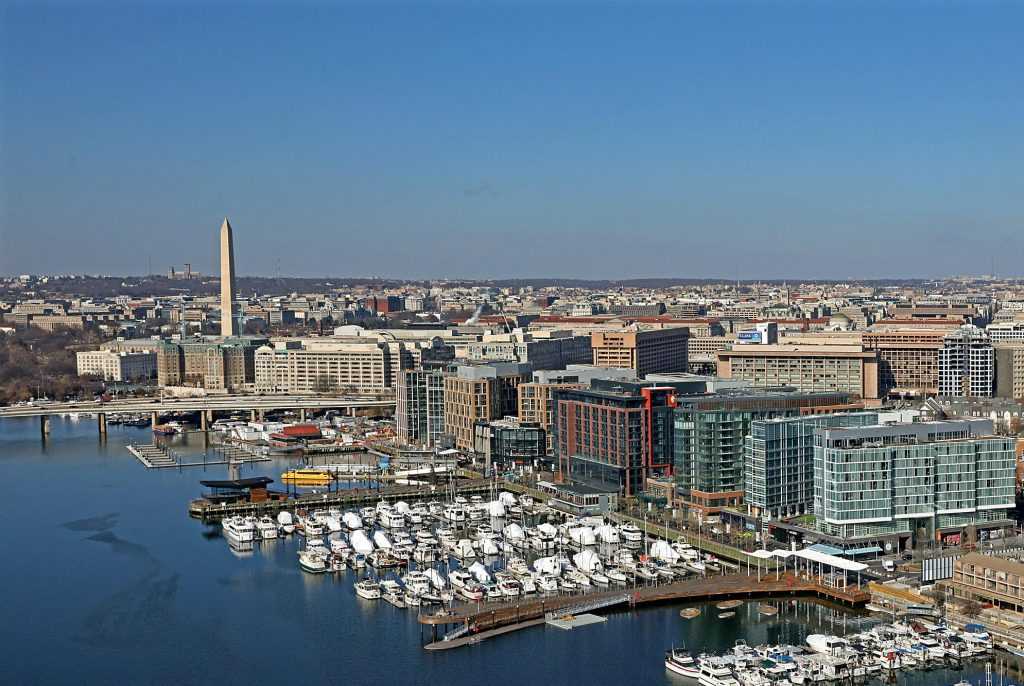Improving building performance requires coordination among many different industry players. The Building Innovation Hub (Hub) in Washington DC is a new project from IMT that helps the building industry do just that. Below is an interview that Hub staff conducted with Clark Construction Group. The original post is on the Hub website.
Transforming the way DC approaches building performance means getting support from community leaders, like Clark Construction Group, a Transformer-level member of the Hub. We talked with Fernando Arias, Clark’s Director of Sustainability, about becoming a Founding Member of the Hub, and the biggest challenges and opportunities he sees for the building industry.
How does Clark see its role in helping the buildings community adapt to decarbonization initiatives and improve building performance?
Building stronger, more sustainable, and equitable communities is a foundational pillar of our values at Clark. We’re committed to growing with our communities to new targets and incentives for a lower-carbon economy. And we take great pride in executing innovative green building construction with less energy intensity like we’re doing at Amazon’s second US headquarters at National Landing.
We can apply construction knowledge and an understanding of supply chain management to the practicality of accomplishing decarbonization initiatives during construction and ultimately during renovations.
We continue to be excited to provide dynamic opportunities for the DC real estate community to connect and build capacity and knowledge around the District’s green building and climate goals through corporate philanthropy and industry engagement. And ultimately, we can be in a position of trust to advise our clients on topics like the Building Energy Performance Standards and local building codes to enable them to improve their buildings proactively.

Image courtesy of Clark Construction Group
What motivated your company to be a Founding Member of the Hub?
Our relationship with the buildings community stretches across the many decades since our founding in 1906. We are excited to be part of the growth and innovation in the DMV region through initiatives like the Institute for Market Transformation’s Building Innovation Hub. As Founding Members, we imagine working with the Hub to demonstrate our support for the District of Columbia’s real estate community in creating a higher-performing, healthier, more equitable, and more resilient DC.
We learned about this exciting project through my appointment to the Green Building Advisory Council at the Department of Energy and Environment. Over the many council meetings, it became clear that the industry truly needs a central hub of information and best practices to align the market toward innovation in the green building industry.
By working closely with the Hub, our partnership will help ensure that the people owning, designing, constructing, operating, and occupying buildings across DC have the tools and connections they need to proactively prepare to comply with DC’s building performance regulations and create better buildings.
What are the biggest challenges and opportunities for DC commercial real estate in the next five years, and how do decarbonization and building performance fit in?
Two questions come to mind when we think about the next five years and the implications of the DC’s Building Energy Performance Standards:
- Does the value chain in building new green buildings understand what needs to be measured and managed to achieve DC’s Zero Carbon by 2050 goals?
- Can we grow job opportunities for small businesses in DC and around the DMV region so they can deliver effective services to owners of existing buildings, who must comply with DC’s Building Energy Performance Standards?
Because questions like these are likely to have various answers depending on who one asks, we believe it’s crucial to arrive at a more precise roadmap to managing and reducing carbon across all stages of the building’s life cycle. At Clark, we believe that by tackling this early, we can all understand what it’s going to take to adapt intelligently and quickly to the changing landscape in government environmental regulations and market based incentives.
Can you talk about the new speaker series you are launching with the Hub?
We’ve long been interested in platform-building to create understanding and alignment on critical issues that impact our buildings industry. With The Hub’s launch, we saw a first-of-its-kind opportunity to leverage the breadth of our market expertise to co-develop resources that promote high-performance buildings and help spearhead industry leadership forums that catalyze green innovation.
The launch is happening in early summer as new federal legislation like The GREEN Buildings Jobs Act (S. 832) and the Federal Building Clean Jobs Act (HR 2060) is moving through Congress. Once signed into laws, these bills “will create important green building jobs across the country while establishing funding for energy and water intensity reductions, greenhouse gas reductions, net-zero energy in new construction, deep energy retrofits, and zero-emission vehicle charging at certain federal facilities” (USGBC).
So, the vision for this thought-leadership series is to explore the critical role that designing, building, and operating buildings play in halting global greenhouse gas emissions by 2050 and possibly how the building industry may benefit from new government programs and incentives.
Through this initiative, we aim to discover and examine the changes we need to make in areas like project planning and forecasting, daily operations, building-related small business development & training, and client engagement. Through the program’s recordings, event summaries, distribution, and after-event promotion, we can give back to the buildings industry in a meaningful and informative way.
Panelists will represent a diversity of race, gender, lived experiences, perspectives, and industries, as well as experience supporting a variety of property types (class and usage). Panels will have a balance of both quantitative approaches and qualitative approaches to a carbon-free economy. We will be announcing key dates for the series soon, kicking off in June 2021 in advance of the AIA Conference on Architecture.